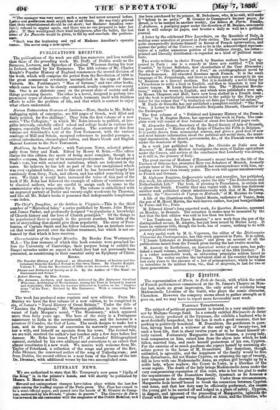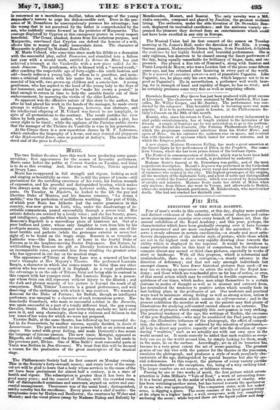PARISIAN THEATRICALS.
The subject of petticoat government is treated in a very amiable man- ner by Madame George Sand. In a comedy entitled Marguerite de Saint Gemme, lately produced at the Gymnase, she exhibits a husband who is most decidedly henpecked, but the hen is such a good creature, that her pecking is positively beneficial. M. Desaubiers, the gentleman in ques- tion, having been left a widower at the early age of twenty-two, led such a boon life, that in about twelve years or so he found himself ut- terly ruined. Fortunately Marguerite de Saint Gemme, a young lady, took compassion on him, raised hint from the abyss into which he heel fallen, married him, and made herself protectress of his son, Cyprien. For the exercise of so much goodness she repays herself by assuming ab- solute power in the house of M. Desaubiers. Her despotism, though unlimited, is agreeable, and the happiness of the family would be free. from disturbance, did not Master Cyprien, on attaining the age of twenty, fall in love with one Mademoiselle Anna, an orphan girl brought up by a noble lady, whose nephew, the Count de Luny, is a libertine of the worst repute. The death of the lady brings Mademoiselle Anna under the
compromising reputation of this roue, who is but too glad to make the acquaintance of the Desaubiers family, inasmuch as he foresees a new conquest in the charming Marguerite. Under these circumstances,. Marguerite feels herself bound to break the connexion between Cyprien. and Anna, and that her duty may be efficiently performed, she causes the young girl to be carried. off and lodged in a place of safety. Cyprien, in despair,. and ignorant of the proceeding of Marguerite, upbraids the Count with the supposed wrong infficted on Anna, and the libertine, who is renowned as a mortiferous duellist, takes advantage of the young stepmother's terrors to urge his dishonourable suit. Even in the pre- sence of M. Desau.biers he unscrupulously pursues his advantage ; but the wrong that is not perceived by the father is comprehended by the son, who suddenly comes forward as the protector of Marguerite. The courage displayed by Cyprien at this emergency proves in every respect beneficial. The Count, abashed, desists from his nefarious purpose, and Marguerite, convinced that Cyprien can defend the honour of a wife, allows him to marry the really immaculate Anna. The character of Marguerite is played by Madame Rese-Cheri. M. Mario Uchard, who some time since made his data as a dramatist with the successful play, called Fiammine, and stumbled into a failure last year with a second work, entitled Le Rctour du Mari, has just achieved a triumph at the Vaudeville with a new piece called La 8e- conde Jeunesse. The gentleman, who is blessed with a " second youth," after reaching the respectable age of forty-eight—his ninth lust-um and odd—basely seduces a young lady, of whom he is guardian, and main- tains a criminal relation with her under his own roof, to the infinite scandal of hisiwife, two grown-up children and a son-in-law. A young gentleman, who has aspired to the hand of the young lady in the days of her innocence, and has gone abroad to "make his crown a pound," is kind enough to return in time to help the amiable family out of their embarrassment, by marrying the victim of the elder Lothario. So apparent was the offensive nature of this story to the author, that after he had placed his work in the hands of the manager, he made every attempt to withdraw it. The manager, however, was obstinate, and the intellectual offspring of M. Uchard was forced to see lamplight, in spite of all protestations to the contrary. The result justifies the view taken by both parties. An author, who has contrived such a plot, has every right to be timid ; while the applause of the Parisian public shows that the manager of the Theatre du Vaudville is wise in his generation. At the Cirque there is a new equestrian drama by M. F. Labrousse, which embodies the biography of a horse, and may remind old playgoers of the High-mettled .Racer, once so popular at Astley's. The name of the steed and of the piece is Fanfare.



























 Previous page
Previous page